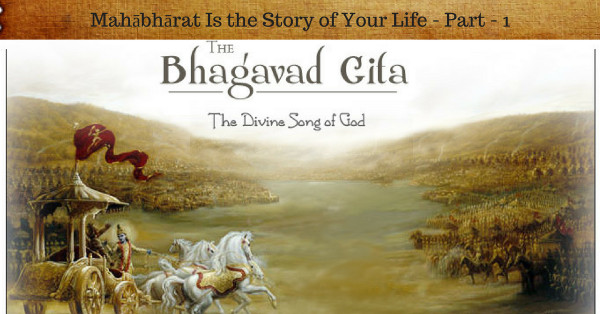Mahābhārat, literally meaning the great Bhārata, is a grand narration about the nation and civilization, which is now known as India. It was then a nation ruled by king Bhārata and his descendants.
dharme cārthe ca kāme ca mokśe ca bharatarśabha I
yadihasti tadanyatra yannehasti na tatkvachit II
~ Mahābhārat, Ādi Parva 56.33 ~
‘O Scion of Bharat race, whatever dharma (righteousness), artha (economic growth), kāma (pleasure) and mokṣa (liberation) exist in this text is found elsewhere, but what is not found in this text does not exist elsewhere.’
Look into your life! Your whole life is nothing but the Mahābhārat War. The Mahābharāt should be read again and again to understand the intricacies of life, the complications of life, and the ability to handle life.
The true story of this perfectly recorded epic is about two warring clans, Kauravas and Pānḍavas, closely related to one another. Dhṛtarāṣṭra, the blind king of Hastināpur and father of the 100 Kaurava brothers was the brother of Pānḍu, whose children were the five Pānḍava princes. It is a tale of strife between cousins and ultimately between dhārmic and adhārmic, righteous and unrighteous civilizations.
Since Dhṛtarāṣṭra was blind, Pānḍu was made the king of Hastināpura. Pānḍu was cursed by a sage that he would die if he ever entered into a physical relationship with his wives. He therefore had no children. Vyāsa says that all the five Pānḍava children were born to their mothers Kuntī and Mādri through the blessing of divine beings. Pānḍu handed over the kingdom and his children to his blind brother Dhṛtarāṣṭra and retired to meditate in the forest.
Kuntī, who is the embodiment of tapas, spiritual penance, had received a boon when she was still a young unmarried adolescent, that she could summon any divine power at will to father a child. Before she married, she tested her boon. The Sun god, Sūrya appeared before her. Karṇa was born to her as a result. In fear of social reprisals, she cast the newborn away in a river. Yudhiṣṭra, Bhīma and Arjuna were born to Kuntī after her marriage by invocation of her powers, and the twins Nakula and Sahadeva were born to Mādri, the second wife of Pānḍu.
Yudhiṣṭra was born to Kuntī as a result of her being blessed by Yama, the god of death, dharma and justice, Bhīma by Vāyu, the god of wind, and Arjuna by Indra, god of all the divine beings. Nakula and Sahadeva, the youngest Pānḍava twins, were born to Mādri, through the Divine Aśvini twins.
Dhṛtarāṣṭra had a hundred sons through his wife Gāndhārī. The eldest of these Kaurava princes was Duryodhana. Duryodhana felt no love for his five Pānḍava cousins. He made many unsuccessful attempts, along with his brother Duśśāsana, to kill the Pānḍava brothers. Kuntī’s eldest son Karṇa, whom she had cast away at birth, was found and brought up by a chariot driver in the palace, and by a strange twist of fate, joined hands with Duryodhana.
Dhṛtarāṣṭra gave Yudhiṣṭra one half of the Kuru kingdom on his coming of age, since the Pānḍava prince was the rightful heir to the throne that his father Pānḍu had vacated. Yudhiṣṭra ruled from his new capital Indraprastha, along with his brothers Bhīma, Arjuna, Nakula and
Sahadeva. Arjuna won the hand of princess Draupadī, daughter of the king of Pāñcāla, in a svayaṁvara, a marital contest in which princes fought for the hand of a fair damsel. In fulfillment of their mother Kuntī’s desire that the brothers share everything equally, Draupadī became the wife of all five Pānḍava brothers.
Duryodhana persuaded Yudhiṣṭra to join a gambling session, where his cunning uncle Śakunī defeated the Pānḍava king. Yudhiṣṭra lost all that he owned—his kingdom, his brothers, his wife and himself, to Duryodhana. Duśśāsana shamed Draupadī in public by trying to disrobe her. The Pānḍava brothers and Draupadī were forced to go into exile for fourteen years, with the condition that in the last year they should live incognito or ajyāta vāsa.
To be continued…

